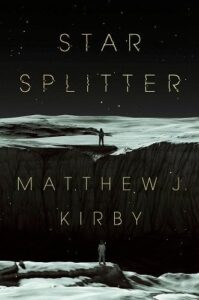Buy this from Bookshop.org to support local bookstores and the Lesbrary!
Content warnings: violence, death
A note: I listened to the audiobook of Star Splitter. It’s a good one, but may have led to misspellings in this review.
Let’s say you lost all memories of the past three days. You’re still you, right? You’re just you minus a few days. You’re still the same person in the same body.
But what if you weren’t?
What if a body died with those memories, but an older version of you remained—would you still be you? Would the dead body be you, and would you have died?
These sorts of questions define Star Splitter by Matthew J Kirby. To explore the universe, humanity uses a sort of teleportation that uploads a person’s data and sends it lightyears in a matter of days. The person’s data is stored, and they can be re-downloaded, or updated based on their new experiences. That person might have their data uploaded, live several years, and then have the data sent home.
Before I give too many spoilers, let me just say that this is a book well worth the read for any science fiction fan. It engages consistently with deep, thematic wonderings while telling a story of space travel and disaster. It has characters a reader can easily hate one moment and sympathize with the next. If you’re on the fence about reading this book, go and do it! Don’t let my review take any surprises away!
The book is about Jessica Mathers, a 16-year-old girl who doesn’t want to cross the universe and become her parents’ research assistant. She wakes up (Before) on a ship, but her parents are delayed. The ship’s crew is less than thrilled with a sulky teen. It’ll be okay when her parents arrive, though. Right?
The book is about Jessica Mathers, a 16-year-old girl who doesn’t want to cross the universe and become her parents’ research assistant. She wakes up (After) in a crashed lander on an alien planet. There are signs someone else is here. Graves, too. Someone else is better than being alone, though. Right?
I rarely encounter a book that so thoroughly uses its genre to explore a theme. Questions of identity, experience, and loss of one’s self are personal and universal at once. The book affected me while I read it; I cared deeply for the outcome of the story and the fate of the character(s). Throughout the dual timelines, I got to know Jessica twice. I started to ask myself which was “the real” Jessica, if there was one, if both could make it, and what outcome I could possibly hope for. It was an intense read!
When it comes to men writing queer women, I’ve seen mixed results. Some are honestly pretty awful, some well-intentioned but wide of the mark. This one is a bulls-eye. The society portrayed is queer-normative, with no coming out, and an adult lesbian couple is among the supporting cast. Jessica has an unrequited crush on a girl called Avery, someone with a wicked unicorn costume, a bit of an awkward streak, and not too much ego. Jessica is just the right amount of smitten. She thinks fondly of Avery, imagines telling her the truth, jokingly names a constellation after her. Jessica is a lot of things—she needs to be, for the themes to work. She’s proud, petty, determined, loving, childish… she’s a lot. Being queer is a piece of that complex identity.
I can see how this wouldn’t appeal to some readers—not everyone enjoys sci-fi, and Jessica is a realistic character, which means sometimes she’s hard to like, though that is the point in this case. If those are not deal-breakers for you, then I strongly recommend Star Splitter.

